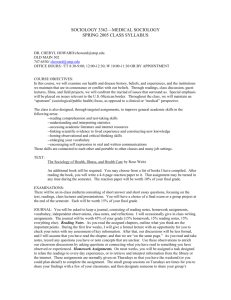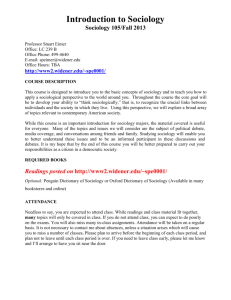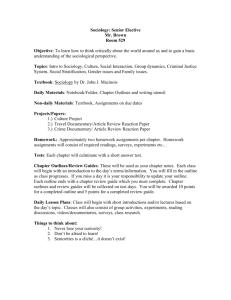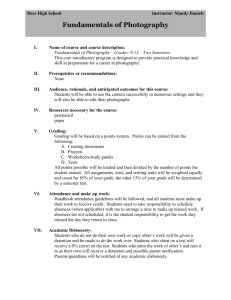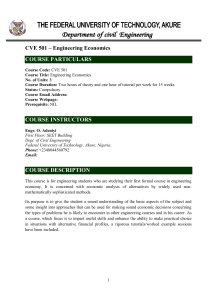med soci fall2015 syllabus
advertisement
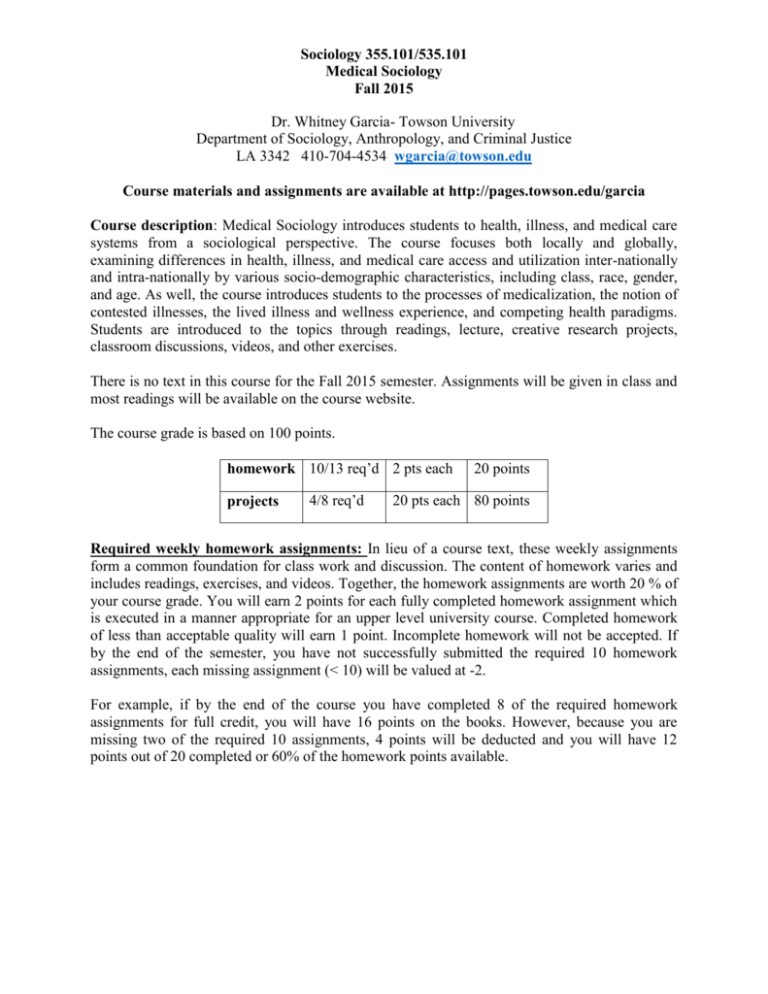
Sociology 355.101/535.101 Medical Sociology Fall 2015 Dr. Whitney Garcia- Towson University Department of Sociology, Anthropology, and Criminal Justice LA 3342 410-704-4534 wgarcia@towson.edu Course materials and assignments are available at http://pages.towson.edu/garcia Course description: Medical Sociology introduces students to health, illness, and medical care systems from a sociological perspective. The course focuses both locally and globally, examining differences in health, illness, and medical care access and utilization inter-nationally and intra-nationally by various socio-demographic characteristics, including class, race, gender, and age. As well, the course introduces students to the processes of medicalization, the notion of contested illnesses, the lived illness and wellness experience, and competing health paradigms. Students are introduced to the topics through readings, lecture, creative research projects, classroom discussions, videos, and other exercises. There is no text in this course for the Fall 2015 semester. Assignments will be given in class and most readings will be available on the course website. The course grade is based on 100 points. homework 10/13 req’d 2 pts each projects 4/8 req’d 20 points 20 pts each 80 points Required weekly homework assignments: In lieu of a course text, these weekly assignments form a common foundation for class work and discussion. The content of homework varies and includes readings, exercises, and videos. Together, the homework assignments are worth 20 % of your course grade. You will earn 2 points for each fully completed homework assignment which is executed in a manner appropriate for an upper level university course. Completed homework of less than acceptable quality will earn 1 point. Incomplete homework will not be accepted. If by the end of the semester, you have not successfully submitted the required 10 homework assignments, each missing assignment (< 10) will be valued at -2. For example, if by the end of the course you have completed 8 of the required homework assignments for full credit, you will have 16 points on the books. However, because you are missing two of the required 10 assignments, 4 points will be deducted and you will have 12 points out of 20 completed or 60% of the homework points available. Sociology 355.101/535.101 Medical Sociology Fall 2015 Term projects: There are eight different types of projects linked to different topics throughout the semester. You are required to complete four of these projects and each is worth 20 % of your final grade. Quantitative analysis Windshield observation research Lived illness Experience interview Content Analysis of drug advertisements Organizational study Health care setting observation Alternative paradigms provider interview Comparative Health care systems In this project, you will select three counties at different levels of GDP. For each, you will look up demographic information, such as infant mortality rates and life expectancy, and you will use an online website to create population pyramids for each country. Based on the information you gather and information from class and from readings, you will identity health priorities for each county and suggest possible policy interventions. You need a car and a driver for this project! You will create a working map of your assigned route and with safety always first and foremost, your friend will drive while you will make notes on a number of community characteristics which are visible from the car, including things such as grocery stores, green spaces, litter, etc. You may have to make the drive a few times. Afterwards, you will write up a description of your observation experience and an analysis of your findings as they relate to environmental health. In the lived experience interview, you will select a respondent, who you will interview for approximately 1 hour. You will create questions to guide the interview, record the responses, and then analyze the interview, applying ideas from assigned readings and class discussion. The topics linked to the lived experience interviews include contested illnesses, mental illness, chronic illness, disability, and stress. You will select 10 pharmaceutical advertisements. These can be TV commercials (many are available online) or print advertisements. You will create a list of items to compare across the content, such as the sociodemographic characteristics of the people used in the ads, the TV shows or magazines in which the ads appear, how the disorders are described, what imagery is used, etc. You will then analyze your results, drawing on course concepts, such as medicalization and contested illnesses. You will select a particular health care or wellness organization and research its ownership, its personnel, its health care delivery structure, how patients move through the services, etc. This is a good project for those already working for a health care organization or someone preparing for a career in health care management. For the health care setting observation, you will compare two different types of locales. For example, you might compare two emergency rooms, one large one in the city and one smaller community one, or compare an ER and an urgent care center. There are many possibilities. After making an initial visit, you will make a preliminary list of things you want to observe. You will then select an observation time and spend about 1 hour in each locale. Afterwards, you will describe and analyze your observational data. This interview option requires access to providers. For this interview, you will select two health care providers with different approaches to similar types of services. This could be a nurse and a physician talking pain management, am interview about death and dying with someone working in a traditional critical care environment and someone who works in hospice, an allopath and homeopath on overall attitudes toward healing, etc. As with the lived experience interviews, you will create questions to guide the interview, record the responses, and then analyze the interview, applying ideas from assigned readings and class discussion. This is the most traditional of the project options. This is a research project in which you compare the health care systems of the United States with those of two other countries on selected characteristics and discuss your findings. Sociology 355.101/535.101 Medical Sociology Fall 2015 Attendance: Attendance is expected and, therefore, not additionally rewarded. Most students are present for all classes, but the following rather complicated policies are necessary for students who do miss classes. While there are a variety of attendance policies in university courses, I do not adhere to the optional attendance approach because I’ve never had a job where attendance is optional. Therefore, attendance at every class--for the entire period-- is expected and attendance will be taken in the beginning of class and after the break. Additionally, I do not want the responsibility of determining if an absence is valid/excused or not valid/unexcused. Since I realize that in life we can all expect the unexpected, two absences are allowed with no penalty and no explanation, if the need should arise. Students are expected to get information about the missed class and homework due for the next week from other students in class. It is always advisable to ask two people. Please do not contact me about missed content and assignments unless you have contacted your classmates, secured notes, and have questions. Students who are absent may not submit homework assignments for the missed class period since the homework is used in class discussion. Please be sure to factor this into your 10/13 required submissions. If a student is absent when a term project is due, the student must notify me in advance of missing the class for the project to be accepted and the project will have a one letter grade deduction because the student is not present in class to discuss their work. If a student experiences an extended illness or loss and follows the university health and/or bereavement policies, the student affair guidelines are applicable and we should meet as soon as possible. Please read the policies in question at http://www.towson.edu/studentaffairs/policies. Absences in excess of the two allowed result in a 5 point deduction per absence from your final course grade and a loss of homework credit for each additional missed class period. Please see the homework scoring policy to access the full impact of absences in excess of two. Term projects due during the third and subsequent missed classes will not be accepted. As mentioned, attendance means being present for the entire class period. Leaving at the break will be counted as a full absence. However, if the student was present for homework and/or project discussions, he or she will get full credit for any work which was submitted if these half attendances are still within the two allowed. If these are in excess of the two allowed, the full additional absences policies apply. Participation: Obviously, participation is linked to attendance: You can't participate if you're not present. However, you can attend and not participate, although I can’t imagine how boring that is for the student. Unfortunately, I know all too well how boring that is for the teacher. Again, in terms of anticipatory socialization, I’ve never found that just showing up for work is enough. You need to actually work. Participation is part of the student’s work. Attending is necessary, but not sufficient. I know that some students say that they are not comfortable talking in class. If you feel that way, you can either accept that or challenge it. I hope that you will participate fully, stretching beyond your comfort zone. Some degree of participation in most, if not all, classes is expected and not additionally rewarded, although there is no penalty for not participating. However, consistent, well-informed, relevant, and respectful contributions throughout the semester will be rewarded. I do not give out extra credit for participation too liberally, but a few students may earn up to 5 extra points-or half a letter grade- on their overall course grade for exceptional contributions to the classroom. Extra credit for participation is only available to students with two or fewer absences, who have completed all required course work, and who have no challenges to academic integrity (see below). Sociology 355.101/535.101 Medical Sociology Fall 2015 Academic Integrity: The faculty of the Department of Sociology, Anthropology & Criminal Justice expects students to demonstrate academic integrity at all times. Academic dishonesty will not be tolerated in any class. Academic dishonesty includes, but is not limited to, any form of cheating or unapproved help on an exam or academic exercise, copying someone else’s written work without citation, presenting fabricated information as legitimate, any unauthorized collaboration among students, or assisting someone to cheat in any way. Penalties for academic dishonesty are determined by the individual faculty member. The minimum penalty in for academic dishonesty in this class is a zero on the assignment, but I reserve the right to file a formal complaint against the student in any instance which violates academic integrity. Students who are charged with academic dishonesty must remain enrolled in the course and cannot withdraw. Instructors will file a report of academic dishonesty with the Office of the Student Conduct and Civility Education, the Dean of the College of Liberal Arts, and to the Chair’s Office in the department. Personal Problems: If you have an ongoing problem that is affecting your academic work, I strongly encourage you to speak with me as soon as possible. Usually I can make accommodations for unusual circumstances, but can only do so if you let me know in the beginning of the problem, not after an extended absence or the submission of problematic work. The most important thing is for you to take the initiative to communicate with me. You have a wide variety of ways to do so- work telephone, email, mail box, office hours, and before or after class. Students requesting accommodations: If you need special accommodations, you should contact Disability Support Services at 410-704-2638 (http://www.towson.edu/dss/). In addition to that office’s communication with me, we should meet as soon as possible so that we can discuss what I can do to assist you. COURSE CONTRACT
